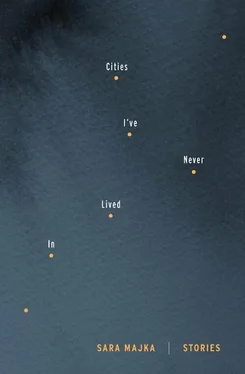As I drove the hills, the sun hit low across an apple orchard and it was so striking that it didn’t surprise me to see an abandoned farmhouse — just like that, just what I was searching for — at the top of the hill. I pulled over and started to walk. There was a neighborhood watch sign nailed to a tree, and I thought of the neighbors watching me in the snow.
Through the window I saw furniture, not arranged to make the room habitable, but grouped together as if to be taken away. It wasn’t a beautiful farmhouse — it was in the style of a musty-looking ranch — or I would have felt the desire to go inside. I was glad the desire was less than it might have been. Still, it was hard to leave, and below the hills I stopped at a church. The door to their secondhand shop opened, but the woman inside said that it was closed, that I would have to come back the next day.

There was a time in my life when several poets I knew gave me their poems, and one man — who I didn’t think was a very good poet otherwise — gave me one that I still have. He wrote about being in a hotel in France and never going out, and overhearing the woman in the neighboring room telling her lover about him, saying that seeing him was like seeing a man at the end of a long tunnel. Some people, I took the poem to mean, are lost already.
I thought of this poem when I went to Poland to find the village my grandparents had emigrated from. I never made it to the village and instead stayed a week in a small hotel off a village square — my room overlooked it — and I would sit in the window and smoke and watch pigeons. In the afternoon I’d go out for a doughnut and a cup of tea and walk around until it was time for an early dinner, and then I’d return to the hotel to read and drink from bottles of wine I had purchased near the train station. It was bad wine and I didn’t drink much of it, but the wine in the hotel bar was worse.
I cried some nights as I wanted a child back then and I was almost past the point of being able to have one. I imagine that’s why I was in Poland, because I wanted time to think about these things, such as this man and the poem he had written, and the little girl I might not be able to have. Seeing a ghost, having your own ghost, being the man at the end of a long tunnel, makes you into a ghost, too, separates you from the people around you. This town in Poland turned out to be a destination for schoolchildren, as Copernicus had once lived there, and his house had been made into a museum. The children came in packs. The streets near the museum were narrow and stone and winding, and I would come upon them, fifteen or twenty children in their winter coats, and always one or two tall, thin women behind them. They would pass and I would spend the rest of the afternoon walking, sometimes stopping at a café to write a letter. I was thinking of Warsaw, of going back to Warsaw, of avoiding the reconstructed city and instead walking the old streets outside of the center, but I never left that small town.

Though I feared I was falling in love with this man, the one who was a drinker, little happened between us. The nights we were around each other would softly fade out. He wore, all spring, winter, and fall, a caramel-colored wool coat with a belt around the middle that he wore untied. He was tall, with sandy-brown hair he kept at his chin. But it was the coat you remembered. I once, when waiting to board a bus, stood behind an older black woman. Her coat was a lot like Ansel’s. It looked as if she had owned it her whole life, as if she had never been without it. She was not stylish — she wore sweatpants and a pair of walking shoes and a polyester scarf around her hair. It was as if the beauty of the coat had happened by accident. She tied it snug to her middle like a bathrobe.
Where did you get your coat? I asked Ansel once. We were drinking midday next to the window in an otherwise dark bar. A wood bench ran the length of the room. He waved his hand in the air, as if to say, who knows. The sun came in and I touched the wool. The question dropped in the way most did back then, not that the effort wasn’t worth it — the effort of conveying information to each other — but that the moment had changed and the question wasn’t there anymore.
Perhaps much of what drew us together was the way life felt to us. My memory was poor, and I had developed the habit of writing the names of things in a small notebook. I had put off doing this, as I worried it would become obsessive, but it got so that I couldn’t remember a book I had just read, or an art exhibit, or a movie that touched me. A friend had screened a beautiful art film with footage of a snowy cabin north of New York. It alternated with shots of the city. Afterward, I couldn’t recall the name of the film or the artist. Or another time, I was talking to a student and asked if he had seen Sans Soleil , and then, seeing nothing register on his face, I asked in a flurry — But that’s a movie, yes? As if I had become worried it was a cleaning product.
Ansel’s memory changed, too. When I was with him, I knew he would remember the moments differently the next day, but there was no way to know in what way, or what his consciousness — when drunk — what his consciousness felt like. I thought of that forgotten art film, with that clicking of a reel running, of the lights flickering at the end, of the moments when two films played over each other.

One night, after being at a bar with Ansel, I dropped him off at his apartment and he tripped on the stairs going up. It was painful to watch so I looked away. I drove from there to a diner on the corner that had recently opened and sat with a cup of tea. The waitress kept asking if I was okay. She was a kind girl whose parents were from India. Her shift was thirteen hours, from 8:00 p.m. to 9:00 a.m. Few people came in during those hours, and fewer people were likely to come, as the owner had fired the night cook earlier that week.
Ansel had wanted me to tell him about the diner, so I paid careful attention and tried to think of what I would say. It was a desperate thing being there. At a certain point I started to cough, bent over at the table. I must not have looked well. I hadn’t taken my coat off. The waitress had teased out the jobs I held, and they were good jobs. She must have wondered what had brought me to such a place at three in the morning.
I never understood why Ansel drank like that. He would drink until he was falling down. In a sense I was magnetized, drawn in, and he must have known that. It seemed the cruelest thing to ask, so I never did, but I wondered if he knew that he did it, and if so, if he understood why. For some reason I had his apartment in my imagination, in the sense that I was able to picture it even though I had never been inside. We used to describe things to each other — details about our furnishings, the style of blankets we used, the layout, how we had set things up. There was one night — in all the time I knew him — when I went home with him. I thought I knew the tradeoff I was making, but I later learned that I was wrong, that I hadn’t known what would happen or what it would feel like to be inside his apartment, or even what his apartment would look like.

After that, we rarely saw each other. It happened slowly. At first because he avoided me, and then later because it was too difficult — almost impossible — to have a drinker like that in your life. That summer my mother visited me in the city. We were walking down the street when a man who looked like Ansel walked by. I said his name, once, twice, and then, just when I was about to give up, my mother said his name more sharply. Still, he didn’t turn. At the stoplight, he rounded the corner, and I walked into the crosswalk to try from there, but this man held his body so that I never saw his face. Later I decided it was both him and not him. My mother would sometimes bring it up. She wanted me to ask, but since I felt both versions were true, there was nothing to learn from asking him. It was a way to hold something — the memory of him — lightly enough so that all possibilities were true, and to not crush anything by asking if I loved him or not, and, if I loved him, trying to understand why.
Читать дальше













